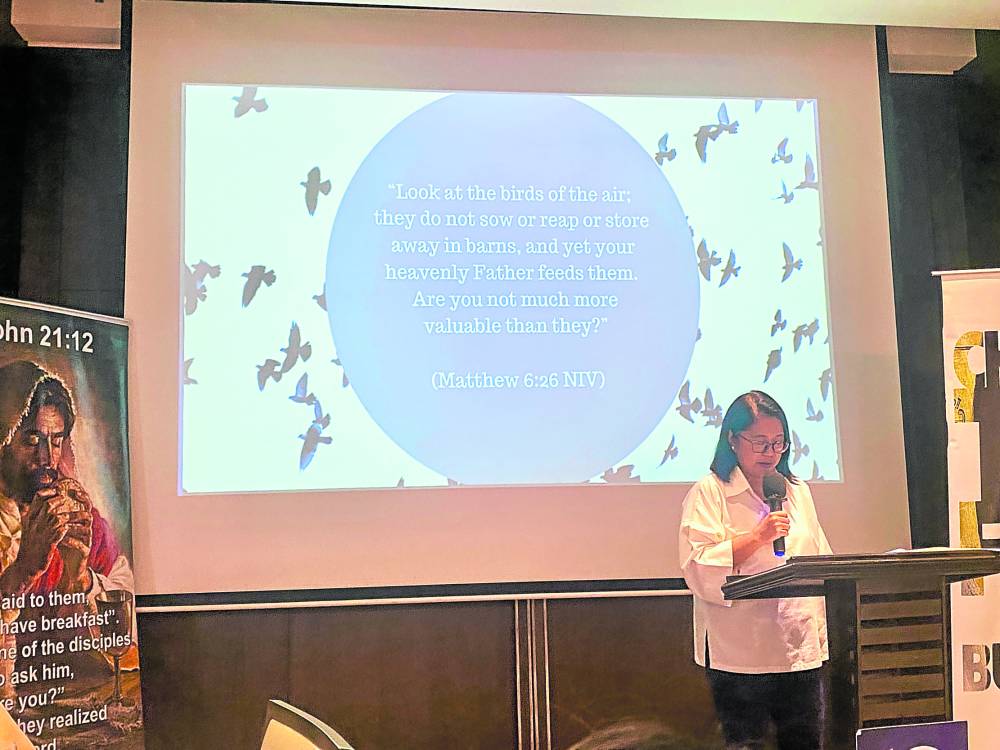Seeking counseling is about breaking bad cycles

An image of a turtle on its back was flashed on the screen. “Going to therapy or counseling is having the courage to seek help when you’re stuck,” said licensed family counselor Cecile Hans Gacias at a formation talk recently held for members of the Brotherhood of Christian Businessmen and Professionals (BCBP) Alabang East Chapter at Somerset Alabang. “Think of mental health as you would physical health. It, too, has symptoms and remedies.”
After earning her Bachelor of Science in Statistics degree from the University of the Philippines Diliman, Gacias spent 24 years in market research operations at a leading fast-moving consumer goods company. She ultimately found her calling in helping others navigate life’s challenges and earned her master’s degree in counseling psychology from De La Salle University.
Gacias walked us through the typical counseling process. In the first session, counselees share their reasons for seeking help. She explained that the first meeting is not the time to fill their heads with psycho-educational concepts; they first need to be able to empty themselves of all the pressure in their heads so they have space to be more open to accepting or considering the counselors’ views and advice.
Set ego boundaries. Lao-Tzu once said, “Care about what others think and you will always be their prisoner.” Recognize your power to choose and control yourself. Gacias noted that while you can’t control your thoughts and feelings, you can change your patterns, behavior and actions. What do you do with that feeling? Which will you entertain? Is it productive? What will you do with that energy? You can choose whether or not to accept that boundary or comment of others.
You must also know your conflict resolution style: fight, flight or freeze. “Fight” is if you prefer to talk about problems immediately to repair them, while “flight” is for those who need space. But Gacias warned that flight people must come back to resolve the issue because sometimes they escape permanently and sweep things under the rug.
Catch negative self-talk. As destructive as it is, Gacias said it’s normal to have thoughts like, “I’m not good enough. The world is not a safe place for me. I am powerless. I don’t have a choice.”
“So be self-aware. When these thoughts invade your mind, counter them with self-checks: What is the evidence that it is true? What’s the worst that could happen? What’s the best that could happen? What is the most realistic outcome? If a friend were in this situation and had this thought, what would you tell them?”
The goal is to get unstuck. Who do you want to be? Stick to it.
Be mindful. Your body is present; is your mind? Do you wallow in past regrets or worries about the future? What can you do about it now? You may not want to check up on your health, but do it now so you address your anxieties. If you’re feeling trapped in a relationship or a job, make a to-do list to get yourself out of it. Practice self-care: Are you eating and sleeping well? If you have a problematic family, having a support system such as a faith community like BCBP can be helpful.
Find the power to change yourself. William Glasser’s Choice Theory states that individuals can control themselves only and have limited power to control others. Take responsibility for your life and withdraw from attempting to direct people’s decisions and lives.
For instance, Gacias advised downgrading toxic friendships to acquaintances. If you’re having trouble with your spouse, apologize so the fight won’t extend. “Hayaan mo na siya mag-ilusyon (let them cling to their illusions),” she joked. “What’s important is you’re okay.”
She noted that Gary Chapman’s love languages (words of affirmation, quality time, physical touch, acts of service and receiving gifts) are all present during courtship. After marriage, the primary language surfaces.
“Never settle for someone who says, ‘I’m really like this, I can’t change.’ There’s always room for improvement. Be with someone who wants to be a better person. Lessen your frustrations to save yourself,” Gacias said.
Find the power to break a bad cycle. Make lifestyle changes to address concerns such as health and failed relationships. In the case of intergenerational trauma like alcoholism, nip it in the bud and take the person to rehab. Normalize family counseling to address generations of infidelity so you don’t make that dysfunction acceptable to your children.
“Decide to break it. You can. Be open to feedback even if it’s unpleasant,” Gacias said. “It’s normal to be defensive when you feel attacked.”
She advised that if you have a friend going through marital problems, let them vent so they can feel heard and validated. Then, ask: “Paano ‘yan kung ‘di siya magbabago? Paano ka? (What if your spouse won’t change? What will happen to you?)”
Then, the insights can start to come in. When things get rough, remember: “We can do it through Him who made me.”

















